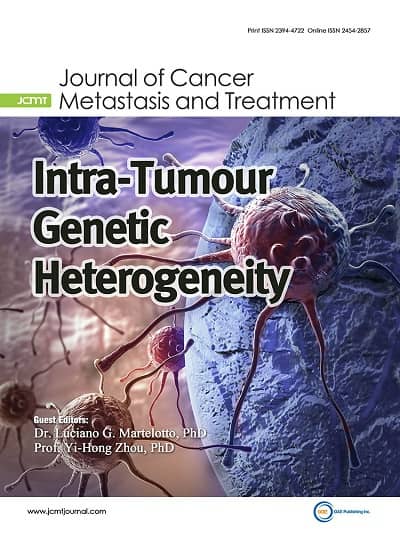
Topic: Intra-Tumour Genetic Heterogeneity
A Special Topic of Journal of Cancer Metastasis and Treatment
ISSN 2454-2857 (Online) 2394-4722 (Print)
Submission deadline: 31 Jul 2018
Guest Editors
Dr. Luciano G. Martelotto
Single Cell Innovation Laboratory, Centre for Cancer Research, University of Melbourne, Melbourne, Victoria, Australia.
Special Topic Introduction
Tumour genetic heterogeneity has been documented in human cancers, and there is burgeoning evidence to demonstrate that a large proportion of cancers, at diagnosis, are composed of mosaics of genetically and phenotypically distinct tumor cell populations or "sub-clones". Recent investigations have illustrated the likely biological and clinical impact of intra-tumour heterogeneity on cancer progression, metastasis, and therapeutic response. The characterization of tumour heterogeneity and sub-clonality is therefore important for furthering our understanding of cancer and for the development of improved and more precise therapeutics.
--------from Dr. Luciano G. Martelotto
Chromosome instability (CIN) and intra-tumoral heterogeneity (TH) are two hallmarks of cancer. Recent investigations have demonstrated the role of CIN, i.e., mis-segregation (MS) of a tumor-specific chromosome and mis-distribution of double minute chromosomes with oncogene amplifications, in controlling the phenotypic transition of cancer cells. This makes TH an inherited feature of both de novo (primary) and metastatic or recurrent tumors. CIN can readily and rapidly give rise to tumor cells with diverse genotypes, which leads to dramatic changes in transcriptional profiles, and thus affects the behavior and survivability of the progeny cells. Hence, CIN plays a critical role in cancer progression and resistance to conventional therapy. Paradoxically, on occasion, CIN interferes with cancer evolution by producing a large number of cells lacking oncogenic function and viability. In such cases, selection would be directed toward suppressing CIN in maintaining the functionally diverse tumor cell subpopulations. This leads to the ability to adjust the MS rate in proliferating tumor cells in accordance with extracellular cues in their microenvironment. Identifying inhibitor(s) of CIN and thereby disrupting the mechanisms maintaining the TH equilibrium needed for optimal tumor growth, would be an entirely new and exciting approach towards cancer treatment. This could lead to the development of powerful therapeutants that could not only treat existing cancer, but potentially prevent tumor recurrence after therapy.
--------from Prof. Yi-Hong Zhou
--------from Dr. Luciano G. Martelotto
Chromosome instability (CIN) and intra-tumoral heterogeneity (TH) are two hallmarks of cancer. Recent investigations have demonstrated the role of CIN, i.e., mis-segregation (MS) of a tumor-specific chromosome and mis-distribution of double minute chromosomes with oncogene amplifications, in controlling the phenotypic transition of cancer cells. This makes TH an inherited feature of both de novo (primary) and metastatic or recurrent tumors. CIN can readily and rapidly give rise to tumor cells with diverse genotypes, which leads to dramatic changes in transcriptional profiles, and thus affects the behavior and survivability of the progeny cells. Hence, CIN plays a critical role in cancer progression and resistance to conventional therapy. Paradoxically, on occasion, CIN interferes with cancer evolution by producing a large number of cells lacking oncogenic function and viability. In such cases, selection would be directed toward suppressing CIN in maintaining the functionally diverse tumor cell subpopulations. This leads to the ability to adjust the MS rate in proliferating tumor cells in accordance with extracellular cues in their microenvironment. Identifying inhibitor(s) of CIN and thereby disrupting the mechanisms maintaining the TH equilibrium needed for optimal tumor growth, would be an entirely new and exciting approach towards cancer treatment. This could lead to the development of powerful therapeutants that could not only treat existing cancer, but potentially prevent tumor recurrence after therapy.
--------from Prof. Yi-Hong Zhou
Keywords
Intra-tumour genetic heterogeneity, single cell sequencing, clonality, bioinformatics, chromosome instability, intra-tumoral heterogeneity, genetic, metabolic
Submission Deadline
31 Jul 2018
Submission Information
For Author Instructions, please refer to https://www.oaepublish.com/jcmt/author_instructions
For Online Submission, please login at https://www.oaecenter.com/login?JournalId=jcmt
Submission Deadline: 31 Jul 2018
Contacts: Lijun Jin, Managing Editor, [email protected]









